Notes
- ↑ "Election of a member for Lyttelton". The Star . No. 148. 2 November 1868. p. 2.
| | This New Zealand election-related article is a stub. You can help Wikipedia by expanding it. |
The 1868 Lyttelton by-election was a by-election held on 2 November 1868 during the 4th New Zealand Parliament in the Canterbury electorate of Lyttelton.
The by-election was caused by the death of the incumbent MP George Macfarlan; he had been elected by the 1867 Lyttelton by-election.
The by-election was won by John Thomas Peacock. As there were no other candidates, he was declared duly elected. [1]

William Sefton Moorhouse was a British-born New Zealand politician. He was the second Superintendent of Canterbury Province.
Lyttelton is a former New Zealand parliamentary electorate. It existed from 1853 to 1890, and again from 1893 to 1996, when it was replaced by the Banks Peninsula electorate.

John Evans Brown was a 19th-century Member of Parliament in New Zealand. Born in Pennsylvania, he came to New Zealand after spending time in Australia, where he was a farmer and US Consul. He farmed in Canterbury, where he was known as "Yankee" Brown. Three of his brothers in law, through his first wife, served as his fellow Members of Parliament. He married a second time, as his first wife died young, and moved back to the United States. On his father's land in Asheville, he came to considerable wealth due to the mining of mica.
Ellesmere was a parliamentary electorate in the Canterbury region of New Zealand. It existed for two periods between 1861 and 1928 and was represented by six Members of Parliament.
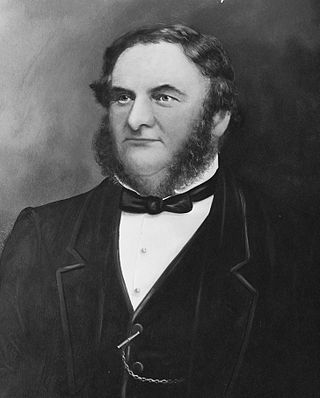
William Barbour Wilson, also known as Cabbage Wilson, was the first Mayor of Christchurch in New Zealand in 1868. A nurseryman by profession, he had large landholdings in Christchurch. His reputation was dented by a fraud conviction, and when he was subsequently elected onto the city council once more, five councillors resigned in protest.

Henry Sawtell was Mayor of Christchurch 1871–1872.

Edward Brenchley Bishop was the fourth chairman of the Christchurch Town Council, and seven years later the sixth Mayor of Christchurch in 1872–1873. Born in Maidstone, Kent to a wealthy family, his family lived in Belgium during his childhood. He took his father's profession as a distiller and worked in London for 21 years. His sister Susannah emigrated to New Zealand in 1849 and in the following year, many Bishop siblings followed her on the Charlotte Jane, one of the First Four Ships of organised settlement of Canterbury. With his brother Frederick, he had a large farm just south of Christchurch, and the suburb of Somerfield continues to use their farm's name. The brothers were spirit merchants in the city.

John George Ruddenklau JP was Mayor of Christchurch from December 1881 to December 1883. A baker from Germany, he was later the proprietor of the City Hotel. He was very active with a number of organisations, founded the German Benefit Association, and was the driving force behind the establishment of the German Church.
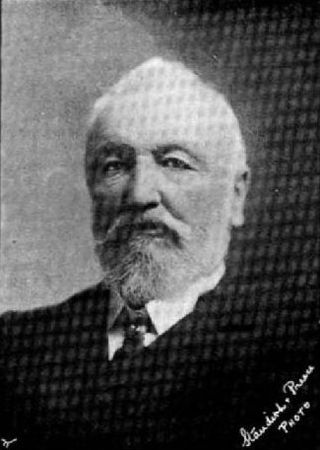
John Thomas Peacock MLC JP was a New Zealand businessman, philanthropist and politician. He came to Canterbury in 1844, several years before organised settlement started.
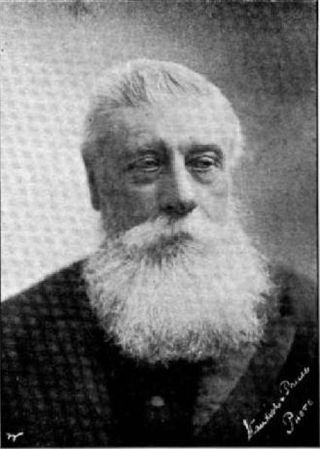
Henry Richard Webb JP FRMS was a New Zealand businessman and politician. He represented Lyttelton in Parliament for 2½ years and was a supporter of education in his later years. Born in Australia, he came to Canterbury in 1868.
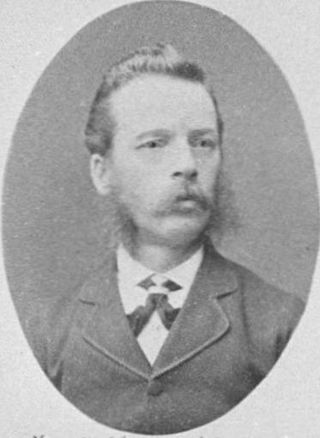
Harry Allwright was a 19th-century Member of Parliament in Canterbury, New Zealand. A painter and glazier by trade, he came out with his parents and siblings in the Cressy in 1850, one of the First Four Ships. He took over his father's company in 1859 and became involved in local politics. He first became Mayor of Lyttelton in 1870 and was re-elected seven times. In the 1879 New Zealand general election, he defeated the incumbent and represented the Lyttelton electorate for three parliamentary terms until his own defeat in 1887. He died in 1892.
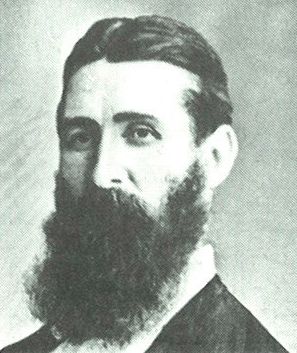
Henry Thomson JP was a 19th-century Mayor of Christchurch and Member of Parliament for the Christchurch North electorate in Canterbury, New Zealand.
The 4th New Zealand Parliament was a term of the Parliament of New Zealand.
The New Zealand Constitution Act 1852 authorised the General Assembly to establish new electoral districts and to alter the boundaries of, or abolish, existing districts whenever this was deemed necessary. The rapid growth of New Zealand's European population in the early years of representative government meant changes to electoral districts were implemented frequently, both at general elections, and on four occasions as supplementary elections within the lifetime of a parliament.
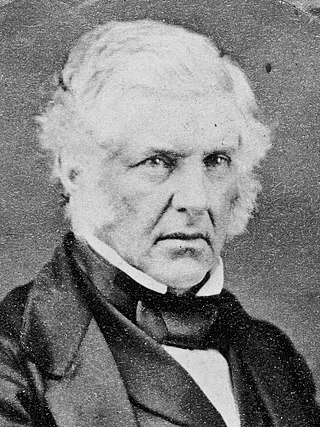
The Town of Christchurch by-election in 1860 was triggered by the resignation of Richard Packer as the Member of the House of Representatives for the Town of Christchurch electorate, and occurred during the term of the 2nd New Zealand Parliament. The previous representative of the electorate, the politician Henry Sewell, had returned after three years in England and the general expectation was that Sewell would be the sole contender for election. The Lyttelton Times wrote several provocative editorials, generally endorsing Sewell for his obvious ability, but criticising him for not publicly talking about his policies and plans. Sewell eventually arranged a public meeting the evening prior to nomination day; this was the only public meeting during the election campaign. After a lengthy address, which was favourably received by the Lyttelton Times, a second contender for the office put his name forward at that meeting: the publican Michael Hart. Sewell, a former premier and one of New Zealand's most senior politicians at the time, was successful against the political novice Hart.
The 1867 Avon by-election was a by-election held on 11 March 1867 during the 4th New Zealand Parliament in the Christchurch electorate of Avon.
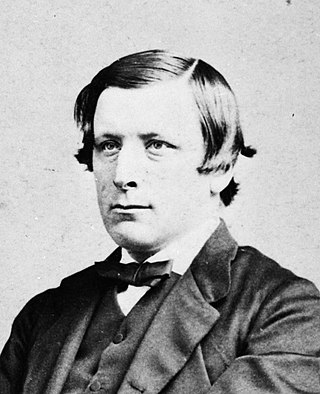
The 1868 Avon by-election was a by-election held on 8 June during the 4th New Zealand Parliament in the Christchurch electorate of Avon.

The Mayor of Lyttelton was the head of the municipal government of Lyttelton, New Zealand. The position existed from 1868, when the Borough of Lyttelton was formed.

The Lyttelton Borough Council Chambers was the headoffice of the Lyttelton Borough Council from 1887 until the late 20th century, when the borough council moved to a number of other buildings. Civic use of the building stopped in 1999, when the building was sold for business and residential use. Registered by the New Zealand Historic Places Trust in 2003, the building was demolished in June 2011 following the 2011 Christchurch earthquake.
George Arthur Emilius Ross was a New Zealand farmer and provincial politician. A cultured and well-educated man, he suffered a breakdown while at Oxford University and relocated to Christchurch for health reasons before he finished his degree. After a short period as a cadet to learn the basics of sheep farming, he became a major land owner. He was an elected member of the Canterbury Provincial Council for the rural Rakaia electorate and was on the Canterbury Provincial Executive Council on a number of occasions including nearly two years as provincial treasurer. Well-liked as an individual, he was chaotic as a businessman and went bankrupt after a harsh winter in 1867 that caused great loss of stock. He suffered a mental breakdown and disappeared from public life thereafter, with his young wife, Sibella, sustaining the family by running a school that her parents had financed for them. Ross died young aged 48 and his wife outlived him by five decades, bringing up a family of eight children by herself. The West Coast town of Ross was named after him during his lifetime.